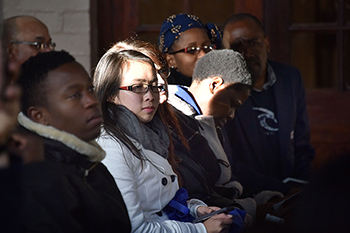Latest News Archive
Please select Category, Year, and then Month to display items
02 January 2025
|
Story Gerda-Marie van Rooyen
|
Photo Supplied
 Leading the research in South Africa is Prof Linus Franke from the Department of Soil, Crop and Climate Sciences.
Leading the research in South Africa is Prof Linus Franke from the Department of Soil, Crop and Climate Sciences.
Scientists are actively pursuing the successful breeding of diploid hybrid potatoes from inbred lines. This is expected to revolutionise potato breeding as it holds the key to rapid genetic progress. It will introduce new varieties for commercialisation through seed. Currently, existing potato variants have a gene that renders self-pollinated seeds infertile.
Prof Linus Franke, an academic in the Department of Soil, Crop and Climate Sciences at the UFS, is leading the research in South Africa. “This technology allows the production of genetically uniform potato seed that is easy to transport and largely disease-free.” He says this differs from conventional breeding whereby only vegetative propagation is possible due to tetraploid varieties in potatoes. It also risks carrying pests and diseases from one generation to the next – leading to the accumulation of pests and diseases with each round of multiplication.
Seed innovation
Prof Franke explains that Solynta BV, a seed company based in the Netherlands that produces potato varieties that can be grown from seed, has included South Africa in their research efforts because it is one of Africa’s largest producers and exporters. Through his academic relationship with Wageningen University and Research, a Dutch institution renowned for its agricultural endeavours and food production, the UFS became involved in researching hybrid potatoes grown from seed.
Diploid seeds containing two sets of chromosomes allow easier gene manipulation to increase predictability and speedier genetic progress. The breeding approach enables the incorporation of tolerance to pests, diseases, abiotic stresses (cold, heat, drought) and other desired genetic traits.
Although Prof Franke is optimistic about this research, he is not blind to disadvantages. “Potato seeds are tiny and have little energy reserves, making it harder to grow potatoes from seed than from tubers.” He says potatoes from seed will take longer to cultivate than tubers, as farmers need to grow plantlets from seeds first, adding six weeks to the growing period. “It is possible that commercial farmers can grow potatoes directly from seed. Alternatively, perhaps more likely, specialised growers will produce tubers of potatoes from seed; these tubers are then sold as seed tubers to other potato farmers, who then continue their normal practices of producing potatoes for the market from tubers.”
Financial benefits
Prof Franke says farmers have reason to get excited. “Seed potatoes will reduce input costs, as varieties with enhanced tolerance to pests and diseases require less pesticides. Planting one hectare of potatoes requires three to four tonnes of potato tubers, but only one 25 g packet of potato seeds.” Since potatoes are a more valuable commodity than maize, this technology might also increase farmers’ income potential.
Postgraduate Open Day: Mapping the journey
2016-06-27

Prospective postgraduate students listen
attentively at the Postgraduate Open Day
Photo: Charl Devenish
“Whether you are a psychologist, a theologian, an economist, a political scientist, a chemist, or a physician, the purpose of knowledge is to improve the lives of others.”
Prof Jonathan Jansen, Vice-Chancellor and Rector of the University of the Free State (UFS), was speaking at the opening of the Postgraduate Open Day, held on our Bloemfontein Campus on 22 June 2016. In addition, he highlighted these grounds for considering postgraduate studies:
• To be globally literate and globally mobile
• To gain the satisfaction of understanding the world more deeply
• To serve as an inspiration to others to further their studies
Prof Fanie Snyman, Dean of the Faculty of Theology, said, “One of the benefits of postgraduate studies especially is that they enable you to think critically. This capacity helps you to understand society better—even outside your field of expertise.”
Prospective postgraduate students were assisted in selecting a suitable postgraduate degree, as a first step in mapping out their postgraduate journey at the UFS.
Kgosi Makhetha, who is currently studying a degree in Business Administration, agreed with Prof Jansen, saying, “Studying gives me great satisfaction. I truly believe that postgraduate studies will give me an edge in the current labour market.” Kgosi plans to enrol for an Honours degree in Industrial Psychology in the Faculty of Economic and Management Sciences.
Prof Jansen concluded by exhorting students to “study to make a difference.”